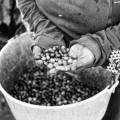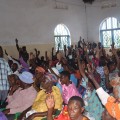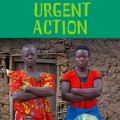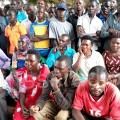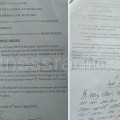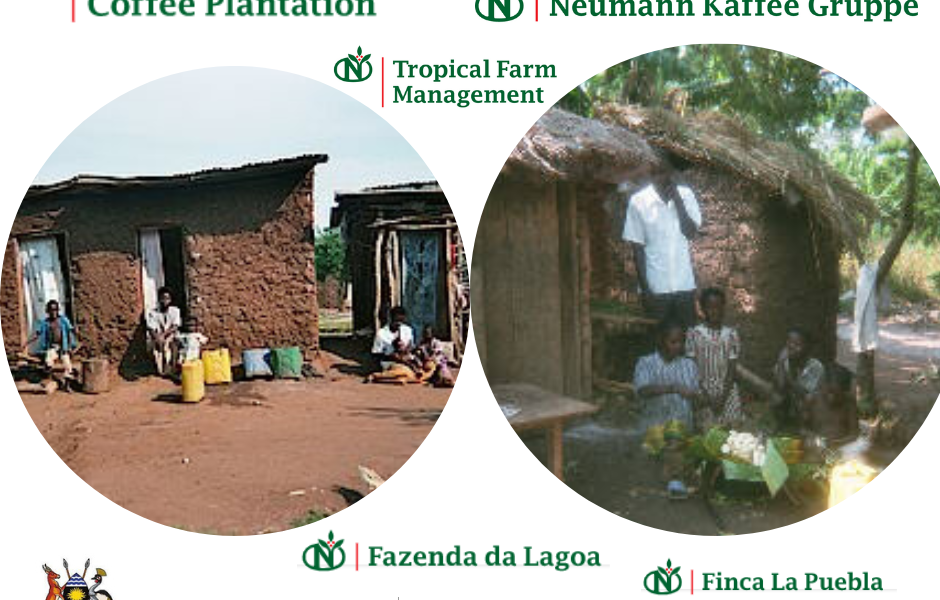By Witness Radio Team
Mr. Lawrence Sekirigi, 76 is one of the thousands of smallholder farmers in Mubende whose dreams of blossoming life were fluttered by the infamous Kaweri Coffee Plantation development. He is a teary one that represents a million Ugandans who have been disposed of or are on the verge of being disposed of.
Acreages of plantations of maize, cassava, potatoes, beans, groundnuts, and bananas that sprouted on his 16 acres of land in the early 2000s painted the right picture of Lawrence’s passion and love for farming.
Ruggedly handsome, fairly aged, and a smooth dark chocolate-colored man with a farming family background adopted the income-generating activity in his youthful stages after dropping out of school for lack of school fees. Armed with an inheritance of 16 acres curved from 40 acres of family land, he ventured into farming earning him Uganda Shillings Five Million, roughly (1,290.47 United States Dollars) in a season.
The past good memories still linger in his mind. With his lifetime inheritance, he grew a variety of crops that he could sell and earn a living and feed his family. To him, growth was the question of “when” but not “whether”. He had a dream of expanding his enterprise and becoming a household name in modern farming.
“My harvests were always in plenty because of good soils and other related factors. My dreams were definitely to grow bigger in business than I was, with many stores supplying both grains and food countrywide. I was one of the richest men here in Kitemba. I achieved this through farming” he narrates with a nostalgic tone.
Those days are now gone but cannot be wished away. As a selfless businessman, he supplied grains and food to hotels in Mubende, Kaweri Prison, restaurants, and Madudu production farm all based in Mubende district before government soldiers and anti-riot police grabbed his land for Kaweri Coffee Investment.
Kaweri coffee plantation farm is owned by Germany-based Neumann Kaffee Gruppe, which according to its website, has 49 companies and with presence in 27 countries. It operates large-scale coffee plantations in Kitemba, Luwunga, Kijunga, and Kiryamakobe villages in Mubende District, Central Uganda.
On a fateful day in 2001, the Ugandan bulldozers under the watch of the army and anti-riot police began moving into the settlements of villagers in Kaweri to clear the area for coffee growing. Property worth millions and cultural sites belonging to residents were razed by the army. This happened with no prior consultations, compensation, or resettlements.
When we visited Lawrence at his new home in Luwunga where he relocated, the toothless, and grey-haired man sat between the muddy kitchen and a house with old iron sheets. Clad in a dirty-pink-like squared shirt and black denim trousers munched away on sweet potatoes and yams mixed with beans.
It was 4:45 pm and now it was coming to dusk. He murmured something to my ears. He revealed how his family has been forced to ration food to survive. They survive on a meal a day. He looked weary, hopeless, and worried. The land grab has left a huge scar in his life.
Lawrence is not alone. Barely two decades later, many people, are living desperate lives. The so-called Kaweri coffee developments rendered many of them homeless, landless, or even useless in their own country.
Thousands of people are scattered everywhere trying to find ends meet for their families. They leave in temporary settlements of muddy houses, and makeshifts in areas where they settled. Others work at the farms of Kaweri coffee to bring food to the plate for their families. However, their payment is low depending on the work they do. They earn 5100 shillings a day equivalent to 1.33 USD upon the completion of the assigned task. If one does not complete the task in a day, he is not paid till he completes it, the next day.
“Most of my friends are suffering, they don’t have where to live, a cause brought about by Kaweri Coffee. People were well before this meaning less development brought by the government.” Ssekirigi added.
“My dreams were completely brought to an end. I am currently staying on land provided to me by a friend. I have nothing in life, and cannot fulfill my responsibilities as a man. I also wanted my 16 children to get the best education which I did not get but this was also not possible.” He shares with regret.
He added that “what hurts me most is that my father and mother plus other relatives buried on our grabbed land were destroyed by the bulldozers during the evictions. A total of 48 graveyards were destroyed. They did not allow us to exhume and transfer our beloved ones who had occupied the grabbed land in the 1930s. My crops, animals including 4pigs, 4 cows and 12 birds were looted by officers, and 32 iron sheets house were destroyed during the hurried and forced evictions.”
Roughly, 4000 smallholder farmers were evicted without prior consultation, compensation, and resettlement by the Ugandan government. The government claimed it had bought land from the landlord Emmanuel Bukko Kayiwa.
The government which leased Kaweri 2512 hectares of land forcefully evicted residents and told them that they would be resettled on another piece of land equivalent in size to the land that each had.
However, Kaweri said the government compensated all those residents who were willing to vacate the land. A brief account of events by Kaweri coffee plantation that Witness Radio has had the opportunity to see indicates that some people were compensated by the government and the rest were relocated.
“In addition, Kaweri demanded to see receipts of the compensation payments as a precondition. These receipts were all produced: each compensation is documented and signed by the recipient, the village leader, the Resident District Commissioner, and the lawyers of the buyer and seller. The compensation comprised either allocation of new plots of land and free transport to the new plot of land or monetary compensation. Overall, compensation in the form of land was provided to 102 families. Another 64 families were given monetary compensation because they did not live in the area but did farmland.” it reads in part.
Witness Radio contacted the Managing Director of Kaweeri coffee, Mr. Etienne Jacobsz Steyn to clarify the eviction. He said he had nothing to report on nor did not have time for us since he was busy.
In what the government and Kaweri called compensation or resettlement, Mr. Kayiira Peter Bakaleke the Chairman of the evicted communities said they were lured into signing agreements that read of their relocation to Kambuye village. The agreement further mentioned that they would be given the same acreage of land as what they were evicted from. This, according to Kayiira did not happen.
“This didn’t happen. People were not compensated and neither were we relocated. The government and Kaweeri coffee plantation are telling lies. People are still suffering.” Kayiira elaborated.
Mr. Ssendagire Geoffrey the area Chairperson of Local Council II in Kanseera Ward said people were never compensated and rejected being given 50×100 ft. plots.
“It was a traumatizing experience. It left many of them depressed. Many of them had over 20 acres and big families. They wondered how they could stay on that land.” the chairman added.
The purported land for relocation was eventually grabbed by a businessman in Mubende Kaweesi George, the area chairperson confirmed


 MEDIA FOR CHANGE NETWORK1 week ago
MEDIA FOR CHANGE NETWORK1 week ago
 SPECIAL REPORTS AND PROJECTS1 week ago
SPECIAL REPORTS AND PROJECTS1 week ago
 MEDIA FOR CHANGE NETWORK1 week ago
MEDIA FOR CHANGE NETWORK1 week ago
 SPECIAL REPORTS AND PROJECTS1 week ago
SPECIAL REPORTS AND PROJECTS1 week ago
 MEDIA FOR CHANGE NETWORK2 days ago
MEDIA FOR CHANGE NETWORK2 days ago
 MEDIA FOR CHANGE NETWORK9 hours ago
MEDIA FOR CHANGE NETWORK9 hours ago
 MEDIA FOR CHANGE NETWORK5 hours ago
MEDIA FOR CHANGE NETWORK5 hours ago
 NGO WORK2 days ago
NGO WORK2 days ago
